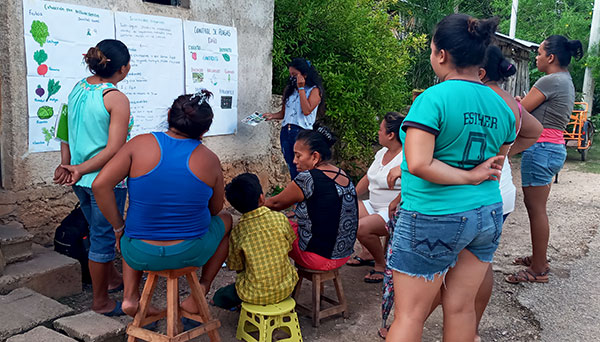Women Saving to Confront Climate Change
Organization: Ko’ox Taani Fundación para el Desarrollo Comunitario y la Inclusión Social A.C.
We promote socioeconomic processes by supporting disadvantaged Indigenous women in Yucatán in the management of their own inclusive and resilient processes.
Location: Espita: San Pedro Chenchelá, Nacuché and Kunché. Uayma: Santa María Aznar and Uayma
Country: Mexico
Other Organizations Involved: UNDP (Alianza de capacitación en temas de Gestión integral de riesgos), Espita Municipal Government, Yucatán (Alianza para la atención integral a las personas participantes).
 ©Fundación Ko'ox Taani
©Fundación Ko'ox Taani
Background
In Yucatán, the climate crisis in 2020 and 2021 has powerfully impacted the most vulnerable populations, among whom most disproportionately affected were Indigenous women living in extreme poverty. They suffer diverse inequalities that are barriers to recovery and lack equitable participation in decision-making processes on climate justice. As a result, their needs and preferences in relation to the environment and in dealing with climate change are frequently ignored.
This project proposes a response to the challenge of climate change and climate justice through various socio-educational initiatives with 15 community savings associations with 200 women members in rural locales of municipalities with high levels of poverty and social inequality, which were declared emergency zones in late 2020.
Goals
The project’s overall goal is to enable 200 women in extreme poverty from four Mayan communities to build their economic and human capacities to grapple with climate change in an inclusive and participatory fashion. This will gradually increase their access to independent savings and credit services, augment their skills and knowledge about issues of climate justice, as well as their capacities for self-sufficient food production and income generation, thus strengthening their economic resilience and climate change-related decision-making capacities.
Main activities
To achieve this goal, participants will be provided with financial education, technical assistance and inputs regarding savings, subsistence food production and income generation. As well, they will participate in human development workshops to increase their knowledge and capacities regarding their environmental rights and how to organize themselves to address climate change. In addition, community savings and credit associations will make linkages with actions for confronting climate change, such as risk reduction plans, early warnings re adverse weather events, and collaboration with agroecological field schools, which promote direct environmental benefits such as biodiverse food production with minimal environmental impacts.
Outcomes
The principal expected outcome is that after two years these 200 women will continue participating in their 15 groups and work in an organized, autonomous manner in the management of their own inclusive socioeconomic processes, which will enable them, over the long term, to confront crises via active participation in decision-making processes related to dealing with climate change.